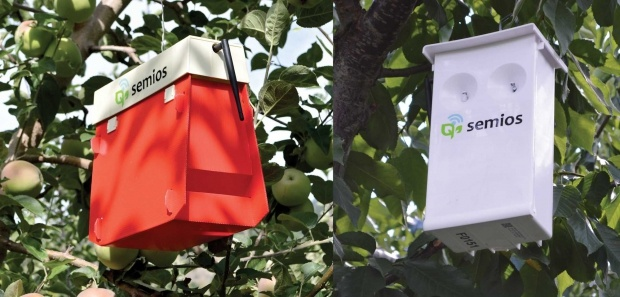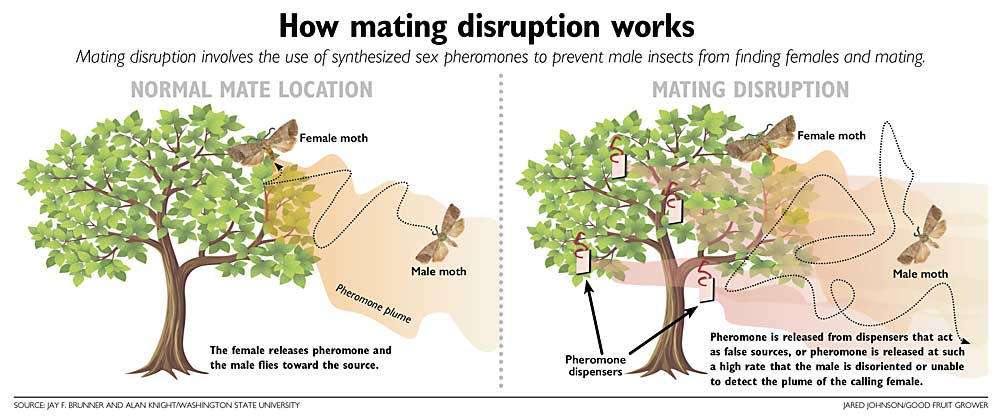Description

Copyright infringement not intended
Picture Courtesy: blog.semios.com
Context: Pheromone-based mating disruption technology has been effective in reducing pink bollworm populations and has shown a 90% reduction in crop losses while improving yields.
Pink Bollworm (PBW) Crisis in Cotton Crops
- PBW is a destructive pest that lays eggs on developing cotton fruits, particularly inside the rounded sac of seeds called bolls. The larvae feed on the seeds inside the boll, causing significant damage.
- Despite the introduction of genetically modified pest-resistant cotton varieties like Bt Cotton, specially designed to combat PBW, the pest has developed resistance. Consequently, these genetically modified crops have become ineffective in defending against persistent PBW attacks.
- Farmers in Haryana, Rajasthan, and Punjab are facing substantial economic losses due to PBW infestations. Reports indicate staggering yield losses ranging from 80% to 90%. This situation poses a severe threat to the livelihoods of cotton growers in these areas.

Traditional Solutions and Challenges
- Scientists are actively engaged in identifying new genes that offer natural resistance against the Pink Bollworm (PBW). However, this process is intricate and time-consuming, involving extensive trials and regulatory approvals. While promising, these genetic solutions require significant time before becoming practical for widespread implementation.
- Traditional methods involving the spraying of pesticides and insecticides prove ineffective once the PBW penetrates the cotton fruit. The pest's protected state inside the boll makes it impervious to external chemical applications, rendering these conventional strategies futile.
Pheromone-Based Mating Disruption Technology (PBKnot or PB Rope L)
- PBKnot utilizes a 20-centimetre polyethylene hollow rope infused with pheromone gossyplure, a chemical emitted by female moths. This scent naturally attracts male moths, forming the basis of this innovative pest management approach.
- The ropes are strategically installed in cotton fields after the crop matures to around 45 days old. At this stage, the cotton plants are more vulnerable to Pink Bollworm (PBW) infestation. Once in place, these ropes emit pheromones, effectively confusing male moths in the vicinity.
- The emitted pheromones mimic the scent of female moths, confusing male moths and disrupting their natural mating process and reproductive cycle. This disruption prevents the male moths from finding actual female moths for mating, leading to a significant reduction in the PBW population within the treated area.
- By disrupting the natural behaviour of PBW through pheromone-based confusion, this technology offers an environmentally friendly and effective solution to a longstanding agricultural challenge, providing hope for sustainable cotton farming in affected regions.

Success and Implementation
- The implementation of PBKnot technology has resulted in an impressive 90% reduction in losses in cotton fields where it has been applied. This significant decrease in damage highlights the effectiveness of the technology in combating Pink Bollworm infestations.
- In 2022, successful experiments were conducted over a substantial area, covering 1,100 acres across 18 locations in India. Building on this success, the technology was expanded further in 2023.
- Farmers utilizing PBKnot technology have reported a quantifiable increase in yield, with production rising by up to 1.5 quintals per acre. This boost in yield is a testament to the efficacy of the approach in protecting cotton crops from pink bollworm damage. The technology has led to the improvement of lint quality, further enhancing the market value of the cotton produced.
Call for Government Intervention
- A collective appeal resounds from scientists and agricultural experts, urging the Indian government to step forward and embrace the innovative PBKnot technology. Their unanimous plea highlights the urgent need for nationwide adoption and implementation of this biotechnology tool.
- Implementing PBKnot technology across all cotton-producing zones in India holds the key to mitigating the Pink Bollworm (PBW) crisis. This strategic intervention has the potential to revolutionize pest management practices and significantly alleviate the struggles faced by farmers dealing with substantial crop losses.
- The implementation of PBKnot on a national scale not only safeguards crops but also strengthens the backbone of the agricultural sector, ensuring the economic stability of countless farming families.

Conclusion
- Pheromone-based mating disruption technology offers hope against PBW infestations. With government support, it has the potential to revolutionize Indian cotton farming, guaranteeing sustainable and prosperous yields for farmers across the nation. This innovative approach stands as a beacon of promise, heralding a brighter future for the agricultural landscape.
Must Read Articles:
Pink Bollworm: https://www.iasgyan.in/daily-current-affairs/pink-bollworm
India’s Falling Cotton Production: https://www.iasgyan.in/daily-current-affairs/indias-falling-cotton-production
|
PRACTICE QUESTION
Q. What are the main factors contributing to the persistent issue of low income in the farming sector in India, and what potential solutions or strategies could be implemented to improve the financial well-being of farmers and enhance the overall agricultural economy?
|















